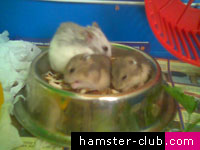A Hamster's diet
Author: Nadia VellaSource: www.hamster-club.com
 INTRODUCTION
INTRODUCTION
In the wild, hamsters eat seeds, grasses, leaves and insects. In captivity, hamsters should be fed a good diet with lots of varieties like seeds, grains, so
me fruits and vegetables. Fruits and vegetables should only be given once in a while as a lot of fruits and vegetables can lead to the hamster having
diarrhoea. By nature, hamsters are a hoarding animal, filling their pouch at its maximum and then putting the contents at a corner of the cage.
Hamsters like a large selection of pelleted hamster diets which are available at all pet shops. Good food is important as it affects the hamsterís health, life span and reproduction.
VITAMINS AND MINERALS
If you are giving your hamster a good and balanced diet, it is unnecessary to give the hamster vitamins, minerals and salt blocks. If you wish to offer your hamster a treat once in a while, buy a hamster commercial product that is nutritious and safe.
HARMFUL FOODS
Avoid giving you hamster sharp, dry, stiff or sticky (such as candy) food, as they will get stuck in the hamsterís cheek pouches and injure the delicate tissue of the hamsterís mouth. These foods should be completely avoided and never given to hamsters. Chocolate and Ďjunk foodí should also be avoided as it is not nutritious to a hamsterís health.

